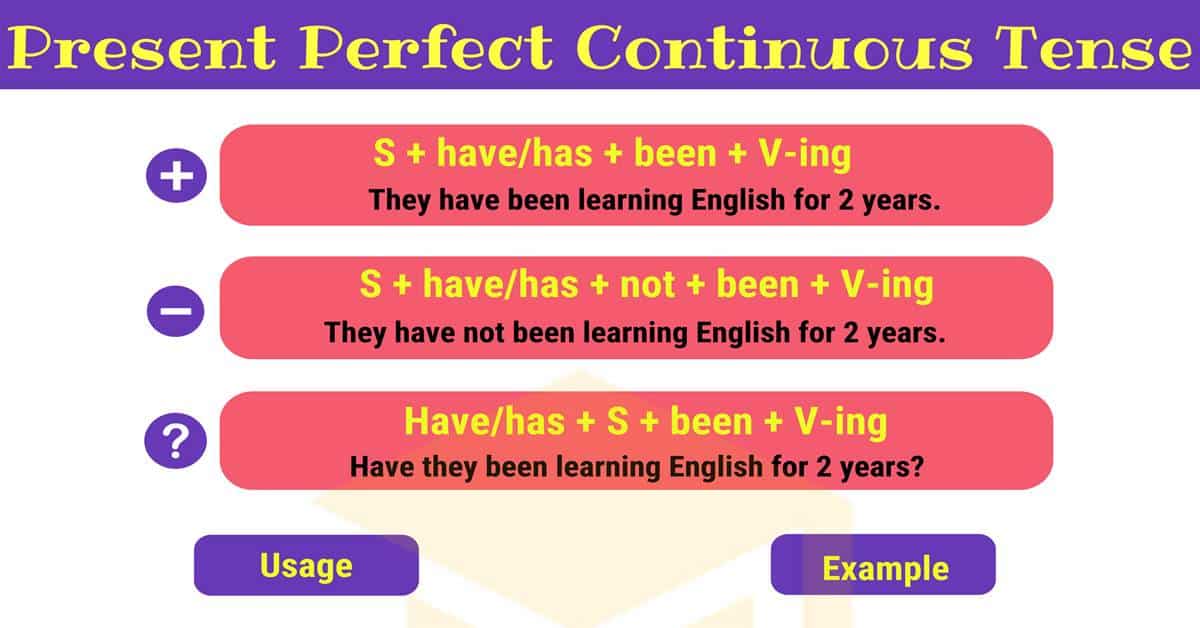PRESENT PERFECT CONTINUOUS
FORMACIÓN DEL "PRESENT PERFECT CONTINUOUS"
El "present perfect continuous" está compuesto por dos elementos: el "present perfect" del verbo 'to be' (have/has been) y el "present participle" del verbo principal (raíz+ing)
| Sujeto | has/have been | raíz+ing |
| She | has been | swimming |

Afirmativa: She has been / She's been running.
Negativa: She hasn't been running.
Interrogativa : Has she been running?
Interrogativa negativa: Hasn't she been running?
EJEMPLO: "PRESENT PERFECT CONTINUOUS", TO LIVE
| Afirmativa | Negativa | Interrogativa |
|---|---|---|
| I have been living | I haven't been living | Have I been living? |
| You have been living | You haven't been living | Have you been living? |
| He, she, it has been living | He hasn't been living | Has she been living? |
| We have been living | We haven't been living | Have we been living? |
| You have been living | You haven't been living | Have you been living? |
| They have been living | They haven't been living | Have they been living? |
FUNCIONES DEL "PRESENT PERFECT CONTINUOUS"
El "present perfect continuous" se refiere a un periodo temporal no específico situado entre el pasado y el presente. El hablante se refiere a algo que empezó y que puede no haber concluido en ese periodo de tiempo. Le interesa tanto el proceso como el resultado, y es posible que dicho proceso acabe de terminar o que aún no haya finalizado.
ACCIONES INICIADAS EN EL PASADO Y QUE CONTINÚAN OCURRIENDO EN EL PRESENTE
She has been waiting for you all day (= todavía está esperando).
I've been working on this report since eight o'clock this morning (= todavía no lo he terminado).
They have been travelling since last October (= todavía no han vuelto).
I've been working on this report since eight o'clock this morning (= todavía no lo he terminado).
They have been travelling since last October (= todavía no han vuelto).
ACCIONES QUE ACABAN DE CONCLUIR Y DE LAS QUE NOS INTERESAN SUS RESULTADOS
She has been cooking since last night (= y la comida preparada tiene un aspecto delicioso).
It's been raining (= y las calles aún están mojadas).
Someone's been eating my chips (= quedan la mitad).
It's been raining (= y las calles aún están mojadas).
Someone's been eating my chips (= quedan la mitad).
VERBOS SIN FORMAS PROGRESIVAS
Con verbos que no suelen utilizar la forma progresiva, empleamos el "present perfect". Por ejemplo: I've wanted to visit China for years.
She's known Robert since she was a child.
I've hated that music since I first heard it.
I've heard a lot about you recently.
We've understood everything.
we've heard this morning.
She's known Robert since she was a child.
I've hated that music since I first heard it.
I've heard a lot about you recently.
We've understood everything.
we've heard this morning.

Present perfect progressive, una ficha interactiva de CarlyQH
liveworksheets.com
liveworksheets.com



